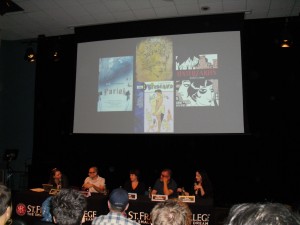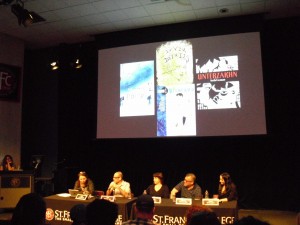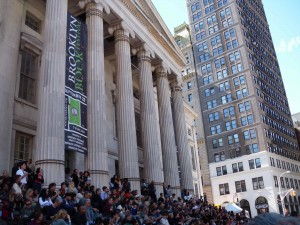by Hannah Means-Shannon
It’s been a big year for comics across the board with record numbers of fans at comic cons and press shows, and the Brooklyn Book Festival tuned into the zeitgeist by offering a wide variety of comics-specific panels. There was at least one easy choice out of the hefty list of possibilities for the comics fan: the Sex Panel. This consisted of distinguished auteur artists Gilbert Hernandez (LOVE AND ROCKETS), Bob Fingerman(PARIAH), Leela Corman (UNTERZAKHN), and Molly Crabapple (DEVIL IN THE DETAILS), moderated by The Beat’s Heidi MacDonald. A substantial, determined line formed to get into the auditorium and the audience got what they came for: a frank discussion of how a comics career intersects, parallels, and sometimes narrowly escapes branding as pornography.
When MacDonald asked the panelists about their early motivations in deciding to “work blue”, Corman’s statement, which all readily supported, was that “it’s how we all got here”, meaning sex was at the root of their work in comics. Corman had drawn pin-up models, Fingerman suggested that from a young age he was “hardwired” to draw nude pictures, and Crabapple considered the demand for sex in comics liberating. An environment that expects you to draw porn also allows you to draw “anything you want”, she explained. Hernandez spoke about the technical aspects of figure drawing, and how for him, it has always been more about “getting it right” than being sexy. Practical concerns, however, like international customs and sales, have affected all of the panelists at one point or another. It kept Hernandez playing it safe in LOVE AND ROCKETS, but taking more risks with smaller projects like BIRDLAND.
MacDonald pushed the boundaries of discussion a little further by asking the panelists firstly, how they defined the boundary between the erotic and the pornographic, and secondly if they ever felt that they had gone too far in breaking taboos. Corman didn’t feel that her book UNTERZAKHN portrayed sex in an erotic way because of its association with violence in the work, but sex itself she feels is essential to any adult story. “I don’t know if you’re telling a human story otherwise”, she said. Corman is only concerned about “going to far” when dealing with publishing restrictions, whereas Fingerman described a kind of self-censorship which will be affecting the upcoming new edition of his MINIMUM WAGE that counterbalances his desire to “purge ugliness” by depicting it. Hernandez laid down one line he doesn’t wish to cross, and that is combining sex and violence in his work. He doesn’t see the connection between violence and sex, which he views as instead a “happy thing”. “That’s why there are so many huge tits in my comics,” he explained, managing to keep a straight face despite cheering and applause from the audience.
Questions from the floor continued to pursue the sex/taboo theme fairly closely. Hernandez was asked whether he has used sex in his works as a plot device, but countered this possibility rather precisely by explaining the undesirable tendency of depictions of sex to slow down plot movements rather than usher them along. One audience member wondered why comics seem more harshly judged for sexual content than standard prose works, but Fingerman pointed out that, actually, a lack of “freshness” occurs in comics whereby drawing scenes repeatedly disengages them from meaning, whereas prose writing is “more immediate”. For Fingerman, prose is therefore more immediately sexualized than comic art. Both Crabapple and Corman expressed their continuing perplexity that such a “natural part of life” continues to be treated as somehow “odd” or subversive, to the point that artists who depict sex in comics are more likely to be called “weirdos”.
All of the panelists expressed some degree of frustration with limitations either keeping them from depicting sex or the labeling that occurs and confines them to drawing sexual comics in order get work. This arbitrary boundary setting in comics seemed equally pernicious to those on either side of the fence simply hoping for wider artistic horizons. As Fingerman commented, despite his wishes, “no matter how hard I try, I just keep sliding back into the gutter”. In the “Sex Panel” at the Brooklyn Book Festival maybe wading around in the gutter did some good as panelists and audience alike addressed the artificiality of many of these labels and the personal motivations that lead comics creators to challenge them.
Hannah Means-Shannon writes and blogs about comics for TRIP CITY and Sequart.org and is currently working on books about Neil Gaiman and Alan Moore for Sequart. She is @hannahmenzies on Twitter and hannahmenziesblog on WordPress.










Thanks for the report. I will check out this festival.
Scott
http://www.ReconditePictures.com
The festival is fantastic! This was my first year and I was totally impressed. More comics content than ever, too!
Nice piece, and that was a great panel. One clarification: my statement about “it’s how we all got here” wasn’t about our careers. It was about how all humans ended up on Earth: sex is how we all got here.
Thanks for posting this piece!
Comments are closed.